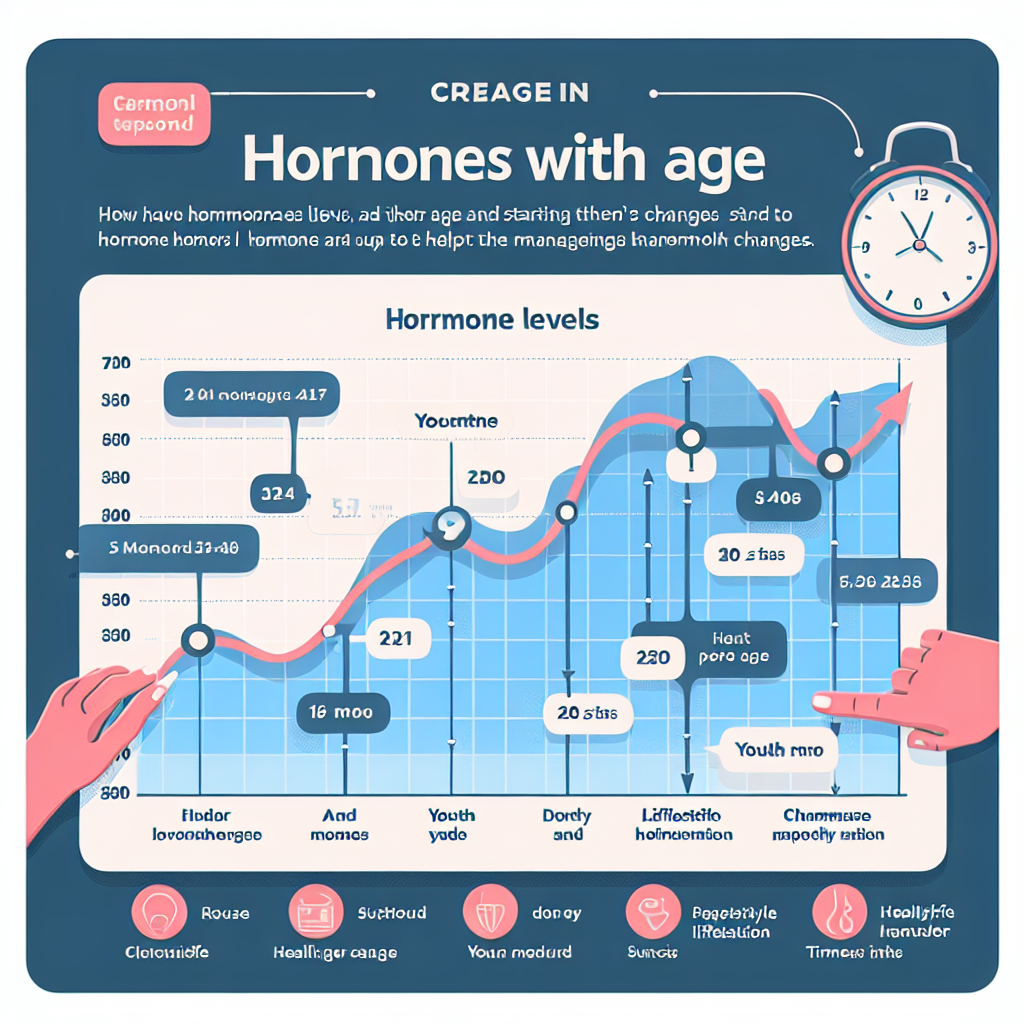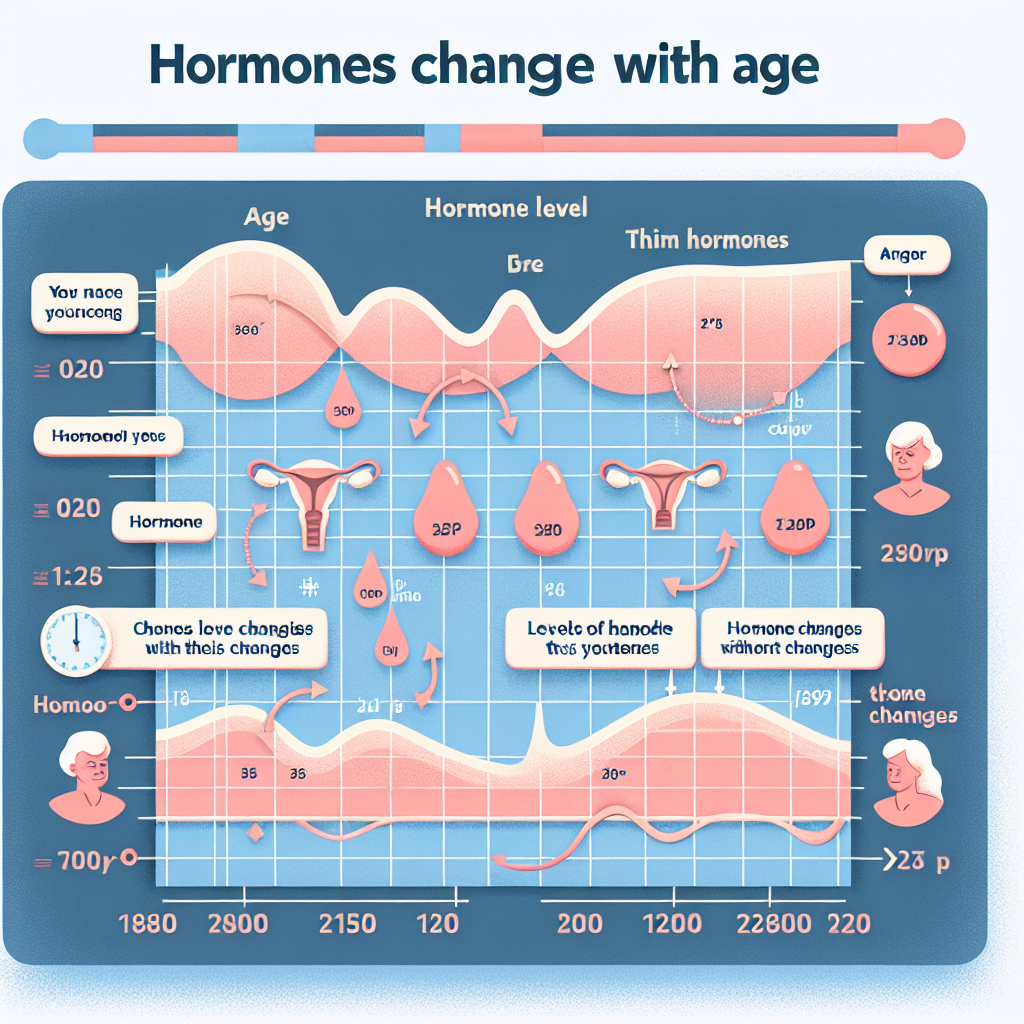How Hormones Change with Age (And What to Do About It)

Discover how hormones change with age and what you can do about it. Learn more about managing these changes and maintaining your health. Click here to start your journey towards vibrant vitality today.
Understanding the Impact of Aging on Hormonal Balance
As we journey through life, our bodies undergo numerous changes, many of which are driven by hormones. These chemical messengers play a crucial role in regulating our bodily functions, from metabolism and growth to mood and sexual health. However, as we age, our hormone levels naturally fluctuate, leading to a variety of physical and emotional changes. Understanding the impact of aging on hormonal balance is essential to maintaining optimal health and wellbeing.
From our early twenties, our bodies begin to produce fewer hormones. This gradual decline continues as we age, affecting both men and women. For women, the most significant hormonal change occurs during menopause, when the ovaries stop producing estrogen and progesterone. This shift can lead to a range of symptoms, including hot flashes, mood swings, and sleep disturbances. Men, on the other hand, experience a more gradual decline in testosterone levels, known as andropause. This can result in decreased energy, reduced muscle mass, and changes in sexual function.
In addition to these sex hormones, other hormones also change with age. For instance, the production of growth hormone, which is responsible for cell growth and regeneration, decreases over time. This can lead to reduced muscle mass and increased body fat. Similarly, levels of melatonin, the hormone that regulates sleep, also decline with age, which can contribute to sleep disturbances.
While these hormonal changes are a natural part of aging, they can significantly impact our quality of life. Therefore, it’s important to take proactive steps to manage these changes. One of the most effective ways to maintain hormonal balance is through a healthy lifestyle. Regular physical activity can help to boost hormone production and reduce symptoms associated with hormonal imbalances. A balanced diet rich in fruits, vegetables, lean proteins, and whole grains can also support hormone health.
In addition to lifestyle changes, certain supplements may also help to support hormonal balance. For instance, phytoestrogens, which are plant-based compounds that mimic the effects of estrogen, can help to alleviate menopausal symptoms in women. Similarly, supplements containing DHEA, a hormone that declines with age, may help to boost testosterone levels in men.
However, it’s important to note that supplements should not be used as a substitute for a healthy lifestyle, and should always be used under the guidance of a healthcare professional. In some cases, hormone replacement therapy (HRT) may be recommended. This involves taking synthetic hormones to replace those that the body is no longer producing. While HRT can be effective in managing severe symptoms of hormonal imbalance, it also carries potential risks and side effects, and should only be used under medical supervision.
In conclusion, hormonal changes are a natural part of aging, but they don’t have to dictate our health and wellbeing. By understanding these changes and taking proactive steps to manage them, we can maintain hormonal balance and continue to lead healthy, fulfilling lives. Whether through lifestyle changes, supplements, or medical interventions, there are many ways to support our bodies as we age. As always, it’s important to consult with a healthcare professional to determine the best approach for your individual needs.
Effective Strategies to Manage Hormonal Changes with Age

As we age, our bodies undergo a myriad of changes, many of which are driven by hormones. These biochemical messengers play a crucial role in regulating our bodily functions, from metabolism and growth to mood and sexual function. However, as we advance in years, hormonal changes can lead to a variety of health issues, including weight gain, mood swings, and decreased sexual desire. Understanding these changes and how to manage them effectively can significantly improve our quality of life as we age.
One of the most significant hormonal changes that occur with age is the decline in sex hormones. In women, this is most evident during menopause, when levels of estrogen and progesterone drop dramatically. This can lead to a host of symptoms, including hot flashes, night sweats, mood changes, and vaginal dryness. In men, testosterone levels gradually decrease, leading to symptoms such as reduced muscle mass, decreased libido, and mood changes.
Another hormone that changes with age is insulin, which regulates blood sugar levels. As we age, our bodies become less sensitive to insulin, increasing the risk of type 2 diabetes. Additionally, levels of growth hormone decrease, leading to reduced muscle mass and bone density, and increased body fat.
Despite these changes, there are effective strategies to manage hormonal imbalances and mitigate their effects. One of the most important is maintaining a healthy lifestyle. Regular physical activity can help regulate hormone levels, improve mood, and reduce the risk of chronic diseases. Strength training exercises, in particular, can help counteract the loss of muscle mass associated with declining growth hormone levels.
Diet also plays a crucial role in hormone regulation. Consuming a balanced diet rich in fruits, vegetables, lean proteins, and whole grains can help maintain stable blood sugar levels and promote overall hormonal balance. Additionally, certain foods can help alleviate symptoms associated with hormonal changes. For instance, foods rich in phytoestrogens, such as soy and flaxseeds, can help alleviate menopausal symptoms in women.
Stress management is another key strategy in managing hormonal changes. Chronic stress can wreak havoc on your hormone balance, exacerbating symptoms of hormonal changes. Techniques such as meditation, yoga, and deep breathing exercises can help reduce stress levels and promote hormonal balance.
Lastly, hormone replacement therapy (HRT) can be an effective treatment for severe symptoms of hormonal changes. HRT involves taking synthetic hormones to replace those that your body is no longer producing in sufficient amounts. However, it’s important to note that HRT carries certain risks and should only be considered under the guidance of a healthcare professional.
In conclusion, hormonal changes are a natural part of aging, but they don’t have to dictate your health or quality of life. By adopting a healthy lifestyle, managing stress, and considering treatments like HRT, you can effectively manage these changes and continue to lead a vibrant, fulfilling life. Remember, it’s never too late to take control of your health and wellbeing.
The Role of Diet and Exercise in Controlling Age-Related Hormonal Shifts
As we age, our bodies undergo a myriad of changes, many of which are driven by shifts in our hormone levels. Hormones, the body’s chemical messengers, play a crucial role in regulating various bodily functions, including metabolism, growth and development, sexual function, reproduction, and mood. However, as we grow older, the production of certain hormones naturally declines, leading to a range of age-related changes and health issues. Fortunately, there are ways to manage these hormonal shifts, and diet and exercise play a pivotal role in this process.
To begin with, let’s consider the impact of diet on our hormone levels. The food we consume can significantly influence our hormone balance. For instance, consuming a diet rich in lean proteins, fruits, vegetables, and whole grains can help maintain optimal hormone levels. These foods provide essential nutrients that our bodies need to produce hormones. Conversely, a diet high in processed foods, sugars, and unhealthy fats can disrupt hormone production and lead to imbalances.
Moreover, certain foods can specifically help to balance particular hormones. For example, foods rich in phytoestrogens, such as soy and flaxseeds, can help balance estrogen levels in the body. Similarly, foods high in omega-3 fatty acids, like fatty fish and walnuts, can support the production of hormones that regulate inflammation and metabolism.
Transitioning to the role of exercise, physical activity is another powerful tool for managing age-related hormonal shifts. Regular exercise can stimulate the production of various hormones that promote muscle growth, improve metabolism, and enhance mood. For instance, physical activity triggers the release of growth hormone, which helps to maintain muscle mass and bone density as we age. Exercise also boosts levels of endorphins, often referred to as ‘feel-good’ hormones, which can help combat age-related mood changes and depression.
Furthermore, certain types of exercise can be particularly beneficial for balancing specific hormones. Strength training, for example, is known to increase levels of testosterone, a hormone that plays a key role in muscle growth, bone density, and libido. On the other hand, activities like yoga and meditation can lower levels of cortisol, the body’s primary stress hormone, thereby promoting relaxation and stress management.
However, it’s important to note that while diet and exercise can significantly influence hormone levels, they are not the only factors at play. Other lifestyle factors, such as sleep, stress management, and avoiding harmful substances like tobacco and alcohol, also play a crucial role in maintaining hormonal balance. Moreover, underlying health conditions can also affect hormone production, so regular check-ups with your healthcare provider are essential.
In conclusion, age-related hormonal shifts are a natural part of the aging process. However, by adopting a balanced diet and regular exercise routine, we can significantly influence these shifts and mitigate their impact on our health and well-being. Remember, it’s never too late to make positive changes to your lifestyle. So, take control of your hormonal health today, and age gracefully, healthily, and happily.